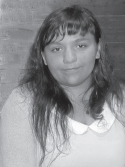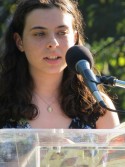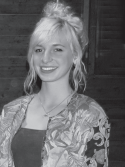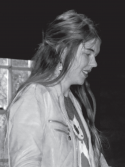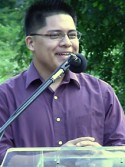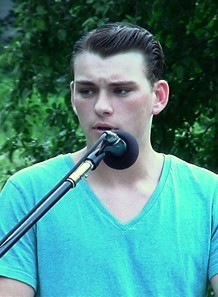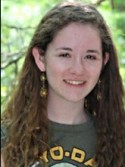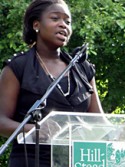
 Since 1993, Hill-Stead’s Fresh Voices Poetry Competition has offered students from all corners of Connecticut the opportunity to write and prepare poems suitable for presentation and publication. Winners receive mentoring at the museum and read at the Sunken Garden Poetry Festival as part of the Fresh Voices Reading on CT Young Poets Day. Their work is also featured here on Hill-Stead’s website.
Since 1993, Hill-Stead’s Fresh Voices Poetry Competition has offered students from all corners of Connecticut the opportunity to write and prepare poems suitable for presentation and publication. Winners receive mentoring at the museum and read at the Sunken Garden Poetry Festival as part of the Fresh Voices Reading on CT Young Poets Day. Their work is also featured here on Hill-Stead’s website.
This month we present the winning poets from the 2013 and 2014 Fresh Voices Poetry Competitions. Please click on a name below to read poetry by that author, or scroll down to read all poems.
Visit Theodate.org to read poetry from past issues of this journal.
2014 Winning Poets
- Shana Blatt, ACES Education Center for the Arts (New Haven)
- Colleen Feeney, Greater Hartford Academy of the Arts
- Sophia O’Brien-Udry, ACES Education Center for the Arts (New Haven)
- Taite Puhala, Westminster School (Simsbury)
- Wenell St. Hill, Great Hartford Academy of the Arts
Read the 2014 Fresh Voices poems in the 2014 Fresh Voices Chapbook (PDF).
2013 Winning Poets
- Julia Alexander, Somers High School (Somers)
- Horlando De los Santos, Greater Hartford Academy of the Arts (New Haven)
- Trey Geisman, Bacon Academy (Colchester)
- Hayley Kolding, Canton High School (Canton)
- Essence McDonald, A.I. Price Technical High School (Hartford)
2014 Fresh Voices Winners
 Shana Blatt
Shana Blatt
Shana was entering her Senior year at Foran High School in Milford, Connecticut and also studying Creative Writing at the ACES Educational Center for the Arts in New Haven when her poem was chosen. An important mentor at the Center has been Bruce Cohen. Shana’s interests beyond poetry include fashion, ornithology, traveling, modern art, political activism, and music.
Think It’s Normal
It’s a classic American scene–
a boy, halfway between
kidhood
and grown-up-hood
and he knows it.
He found Mom’s liquor,
Daddy’s cigarettes,
found bruises in bar fights
he wasn’t in
and he sports them
outwardly, like badges:
his smoke, his flask,
his discolored skin,
while so hard he tries
to be contemplative
he’s staring at the ceiling
he’s calling back
the seven zeros
he’s hoping he can
fall asleep tonight
but it’s five PM and
the stairs aren’t carpeted.
He wants to hate
his parents, his roots;
he wants to ruin himself
so much
that no one claims him
as theirs.
Hotwire cars, smoke pot
in the garage; take a
gap year, become a hippie
or an addict; crawl under
turnstiles; feign
homelessness;
all he has,
clenched
in his hands:
a rum & coke;
an unlit cigarette;
a pocket knife;
and a scholarship.
That Afternoon I Fell Asleep in My Jeans
We’re going to be late, she says,
yelling from downstairs
and I’m fine with it
like I’m fine with the staples on
my floor, and the breakfast
of our Advil and a sip
of a friend of a friend’s coffee,
four pills, all at once;
standing at my dresser,
peeling back labels
to see more label
to see what I’m ignoring.
She yells again, a question,
voice lost in directions and dosages
and the sound stored in my head;
my head set to burst –
can’t blame her for not knowing,
like she can’t blame me for
stealing her ibuprofen.
I raise my eyes to the window,
carefully, because the sun hurts,
even reflected off the snow, it hurts–
I don’t see stars, but little magnet
rocks, never touching, but
sounding like
metallic kisses
bizarre and jarring.
Far Eastern
Open windows next to dinner tables.
Imagine the impulse to jump out.
Peel the skin from your fingers until
blood mixes with new coats of polish.
City lights itself from the inside –lights
on the same circuit as the sun.
The children duck under tumstiles,
with swelled masks, painted by lights, storefronts;
the city gave them life when they rose
up from crosswalks, shouldering backpacks.
The Chinese greaser fans himself with
a deck of cards. He commutes to Here.
Tinnitus
My room sounds different
with people in it.
My friend sits on my bed,
I lie
shirtless on the floor,
mumbling – I forget about the rain.
She says major and minor keys
affect our moods in daily life,
then asks what I hear.
1. I walk across the lawn
in early December. In one window
Alex’s air conditioner rattles
from the ice inside it.
He prefers a dark room,
sixty degrees,
one light switch,
one lamp.
2. I sit in a waiting room
with my dad
and a basket of toys
I am too old to play with.
I don’t understand
the white noise machine
but I can make out the words
on the radio.
3. The rain on the window
turns to footsteps in the hall
when I close my eyes.
A man walks endlessly
trying to reach my door.
When he shows
I hope his gun jams.
The thunder claps. The man stops.
Stuck to my ceiling are
glow-in-the-dark stars;
I think I’d fit in
the stratosphere.
There’s space for me,
I bet.
4. I stare into the drain
with my forehead pressed
against the faucet,
eyes fixed on what’s leaving.
I hear the flow of water
in my head, and it’s useless
because it cleanses nothing.
5. In late winter I walk
barefoot in the snow.
Snow crunches under feet
which have lost feeling, turned into
singular amethysts.
The wind blows minute tumbleweeds
nowhere in particular.
Moccasin-less, I
silently declared
myself an adventurer,
and turned blue
like the sky behind the clouds.
She knows everything,
so I say “nothing.”
We sit in silence, then,
and wonder what key it’s in.
 Colleen Feeney
Colleen Feeney
When chosen to read at the festival, Colleen was beginning her senior year at the Greater Hartford Academy of the Arts, where she majored in Creative Writing. She has always loved writing and making up stories, but it was at the GHAA that she discovered her love for poetry. All of her writing teachers—Meghan Evans, Pit Pinegar, Megan (Collins) Hatfield, Maureen O’Brien, Rafael Oses, and Pam Nomura—helped her not only to love poetry as an art form but also to craft it and find her voice. They have taught her to understand that every word counts and to revise energetically. Colleen hopes to find ways of combining her two loves: creative writing and visual arts.
Seeing You Break
I will never forget you broken,
the time I tripped over your shattered pieces,
and the only words I had to offer were “Are you okay?”
words you tried to return
but I wouldn’t let you.
I won’t forget that day
our world fell apart
and we were all just victims
of the shockwaves
and I saw tears cracking
the surface of your cheeks.
Because I never thought you could break.
Not you, you are the teacher who rolls her eyes,
yours is laughter we can hear down the hall,
you are the one we warned the incoming sophomores
“Don’t give her any crap, she won’t take it.”
Yet somehow, there you were
as shattered as the rest of us.
I will never forget you holding my hand
and telling me “Together.”
“Together we will make it through.”
I will never forget you broken,
because your brokenness reminded me
how fragile we are,
because you showed me how strong we can be.
For Fear of Water
I think of you
though you are miles from here,
but you haven’t left my mind in
weeks and even by this shore
it is no different.
You are with me,
breathing down my neck
as the cool November wind reminds me
it is long past beach season.
You follow me as I walk along the water’s edge
afraid of its cold touch,
yet unwilling to leave its side.
And at night,
I dream.
Not of you,
but of torrent waters,
waves washing over me.
 Sophia O’Brien-Udry
Sophia O’Brien-Udry
Sophia attended the Creative Writing Department of the Educational Center for the Arts located in downtown New Haven, as well as Wilbur Cross High School when she read at the festival. She planned to enter Bard College with Outside of writing, she is interested in film and music. An important mentor in her life has been her poetry teacher, Bruce Cohen.
Celestial Navigation
I want to tell you
about the dung beetles.
About how without the Milky Way
they can’t walk
straight or so narrow,
just stumble like first-time teens
drunk with wine.
It’s tough to navigate when I’m staring
at you through a pinhole in a pixeled laptop,
and I think maybe we’d fare better
with a pair of space suits, just able
to squint through the asteroids.
Khepri, his head the body
of a dung beetle, was seen
as the emblem of rebirth, the pulling
of dung across sand, a sheepish
translation of the sun
being pulled across the sky
and I wonder if he’s like me
or the beetles, maybe you,
lost and a little confused,
unable to see his galaxy,
or does he stay
content, dreaming up
his own planetarium?
Sugar Pops
50 years ago, his Keds echoed
against the checkerboard bricks
laid out like hopscotch chalk. With knives,
these streets were whittled
from the curb, carved in
for him, he thinks, (and maybe for the man-hole
men whose drills pound asphalt and palms;
their hands are tough and small)
and maybe for her, that waitress
with sunspots, who serves
him pink crepes and Sugar Pops
in the dusty leather diner seats. 50 years
and he still can’t figure outthe mechanics of her – how the shadows
the mechanics of her – how the shadows
of her chin line pour over her neck, bobbing
as she bites down on the blue jaw breakers
that take chips off her front teeth. He watches
as she slices pineapple on a butcher’s block,
into discs, into cubes. To him, her hands, now loose
and shaking, still seem tender.
The Greats
Fingers crinkle around
the stub of her cigarette, smoked
down to an elbow-crook curl.
Jo slips behind the strips
of ash-littered hospice sheets,
missing her husband’s Irish riddles,
how their tea mugs smelled of vodka.
Ankle gauze-swaddled and strung up
above his calves,
diabetes swallowed up Jules’s toes
and left him to wrinkle
by the plaster of Cincinnati.
Remembering only
pillbox letters, the name
of his fifth daughter.
Dot wanders to the brim
of Shady Oaks, down to the marsh
that swells with spartina blue crabs
and the whistling of Georgian hen-hunters
when everything is quiet. Dot doesn’t know
how to make malts or lists or stories
anymore. She can only forget.
Clippings
Aunt Patty tells me she’s got a 12-pack
of cherry cola sitting in her trunk, spoiling.
I file my thumb nails – left right left right,
even though Cosmo tells me it’s better
if I file in one direction only. Aunt Patty
and all her sisters have toenails that curl
inwards and pierce the skin
around them. She’ll sit on the couch and stick
her toes in foam molds to stop the pain.
I clip away at the borderlines
of my toenails – little shards sprinkling
around my bathroom tiles, an ugly mosaic.
“I didn’t know soda could spoil,”
I tell her, and she’s bitter
with me: “Flatten then, it’ll flatten.”
Cherry Pits
She spills Earl Gray on her blouse, a blotch
seeping down her stomach. He looks, thinks
of her butt in that little hound’s-tooth
skirt, doesn’t offer her a napkin.
He’d seen her for the first time
at his cousin’s barbeque, tucked up
in the den, watching some show
about a woman who eats her husband’s ashes.
He thought she looked so sweet.
A decade later, he comes
to this diner. Eats a Cheese
Danish in neat bites and pays
for her omelets. She spills
Earl Gray on her blouse.
 Taite Puhala
Taite Puhala
Taite attended Westminster school in Simsbury in 2014 with plans to enter Brown University. In addition to writing, She is pondering a career as an English professor “since there’s nothing else you can do with a degree in writing.” The important mentors in her life as a poet have been Michael Cervas and Naomi Shihab Nye. As her favorite writers, she lists Emily Dickinson, David Mitchell, David Foster Wallace, Adrienne Rich, and John Darnielle.
Dogs of Central Park
The first one I see is small,
half the size of my forearm,
and wearing a cable knit sweater
to keep out the autumn morning chill.
The next is curly and off-white,
like a t-shirt that was mixed in
the laundry with the darks
one too many times.
I measure the walk in dogs that go by:
two French bulldogs, one white, one black,
circling each other in a philosophic dance;
a dachshund scurrying along like a centipede;
the ubiquitous yellow lab, unshakably
jovial and carrying a Wiffle ball it stole from
a little-league pickup game.
A trio of dog walkers is dragged
by a horde of pit bulls, Rottweilers,
Weimaraners, and a few enthusiastic
mutts. Behind them, a team of Chihuahuas
in pink socks tugs along, taking their sweet time.
Two frantic owners try to separate
their German Shepherds while parents
pull their children to the side. They are only
barking at each other, but it’s no use
trying to tell anybody else that.
Two tiny dogs posture on the ground,
drawing an entirely different reaction.
A well-dressed businesswoman hides
a tiny black furball in the chest
of her double-breasted peacoat.
It squirms, looks up, realizes
it is meant to be secret and stays put.
A wizened, silvering Irish Wolfhound
lowers his head. At home, my oldest dog moves
slow, slower than you would expect
considering his age, creaking along on bad knees.
You can see the way the cold nips at them,
ankles shaking, eyes dark and determined.
I measure the space from home
in the number of dogs I have seen
since I left mine. Our puppy bounds along,
chewing the world as she goes. Behind
this majestic old hound, a puppy
with feet too big for its body dashes,
tumbles, gets back up, barks at the big dog
as if to egg him on. He bends his forelegs,
quickly wags his tail.
Dogs keep moving because we love them,
because they love being alive,
even as their joints ache and buckle
and give out, they keep moving
like the lights and sounds in the city, not created
or destroyed, just transferred from body
to warm squirming body in this frosted,
pre-winter morning.
Parting Is All We Know of Heaven
My friend tells me ghost stories
from back home, of jinn,
the virulent kinds of spirits
leveling villages. I want to say
that kind of thing doesn’t happen here,
though I’ve heard of ghosts
more wistful than angry
sitting on windowsills and sharing
the details of their lives. I guess it depends
on the circumstances of their deaths,
or the gossamer shapes of their lives.
The things you thought were solid –
bones, frameworks, first loves –
turn out to be only tulle.
It’s enough to make anyone bitter,
after it’s gone.
The body dies all the time,
skin and hair only shells of cells
already spent and peeled off.
Some people speed up the process.
From eleven onward I hardly ate,
couldn’t see the point,
watched blandly as my body fell away,
adding new layers of wool and cashmere
to protect against the cold, but holding
on to the slough. I sometimes have dreams
of things before they happen,
and think I might be half a ghost.
Which part of you is living?
Is it the center of rushing blood,
or the thin scarf you call your soul?
The Fall of a Sparrow
A bird does not fly, it suspends
from a length of fishing line
the width of a hair, the kind you’d use
to cut clay, the way spiderweb silk
is stronger than steel.
Today, like Atropos, I cut the thread
and let the sparrow fall. By now
it was almost picked over. The fate of the bird
does not depend on the shape of its life,
though augury would have it otherwise –
but its death like this is a red thread
caught on fire. The infinity of sand
descends to dust on the horizon.
At the table, I pluck a tiny bird bone
from my whitened throat.
for love is immortality
black dust makes you
mortal, battle-marked
two fingers in soot and
sweat to paint your face
with a blaze of glory
black ink makes you
untouchable, new
tattoo popping off
your skin like squid
spray, growing beyond
the confines of your body,
which will fade, you say defiantly,
hiding your eyes behind shades,
counting the days like rosary beads.
 Wenell St. Hill
Wenell St. Hill
Wenell graduated from the Greater Hartford Academy of the Arts, with plans to attend Hampshire College. She enjoys reading works by Sharon Olds and won the Wallace Stevens Scholarship Award as a Junior. Wenell writes mostly poetry, something her mother inspired her to do, and uses it as a way to articulate how she views the world. She plans to major in Neuroscience in college and one day open a private practice for therapy.
Interior
Tonight,
through bare rooms,
looking for heaven,
his love
for what is dead
is restless, burning.
“Have you prayed?”
a man asks a coffin,
wondering if the dead might respond.
Someone tell him
a light that mends love
is like sewing various colors,
uneven.
“Have you prayed?” the room echoes back;
the man shivers.
Though what is dead
doesn’t worry about what is living.
Tell him he should sleep now,
keeping his breath.
There is nothing of sleep,
there is nothing of home,
discarded with the first fragrance of burial clothes.
The man begins to cry; the dead stays silent.
His love for
what is dead is helpless,
hopeless.
It’s called:
Loss
Displaced Person.
Dust Bowl
He stood there, arms extended,
reaching towards the light,
his suit pressed and steamed,
standing in the Oklahoma sun.
It was 1934.
He walks the streets every day.
Filth builds up in his lungs,
dry wind cuts at his skin,
dust collects.
He is looking for money.
Families assemble
on broken streets,
begging, crying,
falling apart.
Hunger, stress, mortality eat at memory.
Daughters once proud turn to eloquent bone;
sons develop cancer playing in sandboxes.
The man stops waiting for hope to ride his horse,
unaware that the disease brewing in his heart is not greed
but honesty.
His outstretched hand grabs at loss, not light.
Epithalamium
I dreamed we were married again,
purple lilies lining the aisle.
Faceless people clapping,
clouds of valium in the air.
I see your face in profile,
unshaven,
suit made of rags,
your trembling hands
reaching towards
my veil made of dust.
We were both moths
against a buglight,
wings twitching
as our bodies burned,
I woke up thinking
Hell has not let go of me yet.
Funeral
Sometime later I woke to noise;
he lost his job again,
she was weeping.
We children hid behind paper walls
and cellophane doors.
Same old story:
Why do you do this to me?
Love had vanished in our hearts;
used as iron chains,
we reminded their fraudulent necks
that this relationship was suicide.
But they couldn’t leave us,
we were fledglings,
unaware of a world beyond
ignorance and varnish.
Their hatred pulsed
behind every memory of “family”;
they grew older and so did we.
We left our nest with crooked wings,
our view of family distorted under our parents’ clumsy hands.
The noise stops
but the memories continue haunting.
It won’t stop raining.
The city tries to overpower the sound
of the kitchen clock ticking,
but the incense burning seems to amplify everything:
boxes, memories, black garments.
The saddest part is despite all they did
even in death
hatred never brought them separation
and we children learned
that sorrow is a thing that scars.
Within You
There was an ocean within you,
that had waited almost a century to still.
An ocean that had carried
the weight of family,
an ocean that had watched some
of its children die young.
You carried me as though
I was a part of your very body,
your waves lulling me to sleep.
Waves that have been saturated
with salt tears and fisher man’s blood.
Waves that have sunk ships
carrying the abusive husbands of
grandkids.
Your eyes told me that
you were so happy to hold me,
rock me,
know me.
Getting ready to protect me
from summer storms.
If you had lived,
would you have shared with me
stories of friends
that died before you
and memories of times
spent smoking on this porch?
2013 Fresh Voices Winners
 Julia Alexander
Julia Alexander
Julia Alexander was a graduating senior at Somers High School in Somers, CT when she read at the festival. She was been inspired to write by the small creative writing community at her high school. She is interested in spoken word poetry and participates in poetry slams in the area.
Maternal Instincts
We blew smoke back and forth
on your porch all the way to the end of June.
One night you quietly ran your cold fingertips
down the length of my hair and across my shoulder blade.
With your cracked hand still resting on my freckled back,
I heard you pull in a deep breath
as if you were about to say something
dripping with significance.
Instead you leaned your head backwards and
blew smoke rings up at the flickering porch light
surrounded by moth wings beating hard towards the brightness.
Their shadows danced quickly across the
rotting wooden floorboards of our decaying bodies.
I folded myself carefully on the steps of the only house
I ever felt truly at home in.
I was hiding my sharp edges
for the moment at least.
I listened to your deep, heavy laughter.
It was as thick as the smoke
you blew at me for fifty years.
That laughter still bounces off
the walls of your now empty house.
That summer we were sprawling words thick with good intentions
across each other’s sidewalk-hearts. They were erased
by the sweat and thunderstorms that came with the passing of time.
They do not last until the leaves fall.
You do not last until the leaves fall.
A month later you finally let go.
I had become familiar with the clean tile floors of a small hospital.
I had counted the fifty-four paces it took to run
to your bedside from the elevator.
And I had grown to hate the smell of flowers mixed with formaldehyde.
When I got back home,
I broke an ashtray filled with dried moth wings
in your kitchen sink.
 Horlando De los Santos
Horlando De los Santos
Orlando attended both the Greater Hartford Academy of the Arts and Bulkeley High School when he read at the poetry festival.
How to Wear your Fathers Cologne
You must wear it
With authority and manliness,
Labeling yourself a ladies’ man.
You must act and walk a certain way.
You can’t be a punk.
You must wear it like he wore
Poverty and abandonment,
You have to let the abuse
sink into your surroundings
Making the air
Stale.
You must wear it like
He has worn it.
You can’t cry out.
That’s not how your father wore it.
You have to smell
The cologne on the fabric
Of your shirt
And on the surface of your skin.
You must wear
Alcohol and tears
From the depression and loneliness
That life has taught you.
Just like it taught your
Father.
You can’t wear love,
that’s like washing away the scent.
That’s like washing him away.
 Trey Geisman
Trey Geisman
Trey Geisman was a senior at Bacon Academy, Colchester, CT when his poetry was chosen for the festival. Trey began writing in 7th grade and continued through high school.
WHO’S COUNTING?
I remember looking across the waiting room
Past the plastic chairs neatly ordered in rows,
Past the tacky pictures hanging from the walls.
My gaze fell to my father
Quietly talking to a nurse behind the desk.
When they approached me
It was with masks of empathy and uncertain smiles.
She said I was too young to see him,
At least like this…
(Like this?)
…in this place with drug addicts and the clinically insane.
I was too young to see him detoxing,
Too young to understand.
But where was she
When he was sitting on the rafters,
Rope around his neck?
Why wasn’t I too young
To see him pick up a baseball bat
And beat his friend on the floor in my garage,
His girlfriend screaming for an ambulance.
I didn’t know there was so much blood in a human head.
And yet he cannot remember his last at bat,
Or running home crying for his mother,
His handle on reality blurred by the handle of Dubra.
My age was not in question
When “family night” came around,
All of us sitting next to him,
Assuring him he could come home soon.
On the board we tacked up the names
Of all the drugs he ever used,
Every piece of every abuse scattered like a puzzle,
The poison of our heredity
Coursing through him,
Coursing through me.
 Hayley Kolding
Hayley Kolding
Hayley Kolding was a senior at Canton High School with plans to attend Yale College. A sense of wonder for nature and people has moved her to write poetry for as long as she can remember, and her freshman English class and the New England Young Writers Conference were real turning points for her as a writer. She is also passionate about her home, her family and playing sax and flute with her school’s jazz bands.
Poems were removed at the request of the poet.
 Essence McDonald
Essence McDonald
Essence McDonald was a music production major at A.I. Price Technical High School when she was chosen to read at the festival. She was inspired by poets such as Mind Evolution, Maya Angelou and Edgar Allen Poe. Essence says, “Poetry is a part of me because I have always had a lot to say and it allows me to get my point of view across and express my feelings through the energy I bring.” She does not call poetry a hobby, but rather a way of life. Essence incorporates everyday issues into her craft and often focuses on tribulations that women face.
Substance
I see the love in her eyes for the drug she fiends for
Once the needle taps her vein, she craves more.
She doesn’t mind selling her temple to guys
just to fulfill her desire for the drug Satan prescribed.
Moms don’t got a job
and the liquor keeps her cruisin’.
Pops steady abusing,
mom won’t believe the words her daughter tells her.
Tied up in the web of love she tells her:
“Stop lying, you’re selfish
And even if he did it I’m still not leaving
It’s only me and him ‘till the end.”
Retaliation is bringing the needle to her skin.
As soon as it’s in she is a caged bird finally freed.
Them puncture wounds won’t go away anytime soon,
but neither will the pain from her father she consumes.
And neither will the pain of her accusin’.
Intake is like a rebirth
No more hurt.
She’s on cloud nine
And doesn’t even recall Pops hand down her thigh.
With no hesitation
She receives a vacant mind.
The grief painted on her face is now a naked smile.
Grandma
You were with me for a while.
We shared laughs and cries.
Your beautiful smile kept mine shined, like a tile.
You taught me confidence is a finish no one can wipe off.
Not gone, but in your mind you’re far away.
You don’t remember Essence now
but in your heart I know your unconditional love is strong.
I ran to you after I disrespected my mom and the principles of life,
yet because of you I learned them all.
Your thoughts: philosophical, intelligent
So you taught me to be logical.
Yes, everybody has flaws,
But grandma, you’re perfect to me,
mind, body and all.
If I see your face more often, it’ll make me feel like a kid with cake and lots of frosting.
Happy.
But right now my emotions are strange,
a rushing storm in my heart
that won’t go away.
Praise Before Plates
No one even think of picking up a spoon until grandma blesses the food.
The fish, vegetables, oxtail, rice and peas.
As she raises her voice to rejoice
We lower our heads in respect
And little did we expect she would catch the spirit.
“Thank you lord!
Thank you lord!”
She walks through the family touching everyone in the pit of our stomachs.
Refined State Of Mind
Just me, myself and I.
That’s all I need.
I was born alone.
So I stand alone.
Just me myself and I.
I put my beats on
I block myself
from the world
from the pain it brings
from the struggle
from the strain.
And for emotions I can’t explain
I take out the pen and pad to free my brain.
Oh yea, and my music.
Microphones, I abuse ‘em.
I guess you can call that my substance.
When I write
unwelcomed thoughts are replaced by music that uplifts.
I spend nights alone.
not because I’m sad
but because silence speaks.
When it’s just me
I feel more free
I feel like me.
How much stress can there be?
When it’s just me, myself and I
I feel like a caged bird, finally freed
or a former slave, no more misery.
Yes I emancipate myself.
I feel like more than a million bucks.
I am wealth.
When it’s just me myself and I
I seem to find a refined state of mind.

